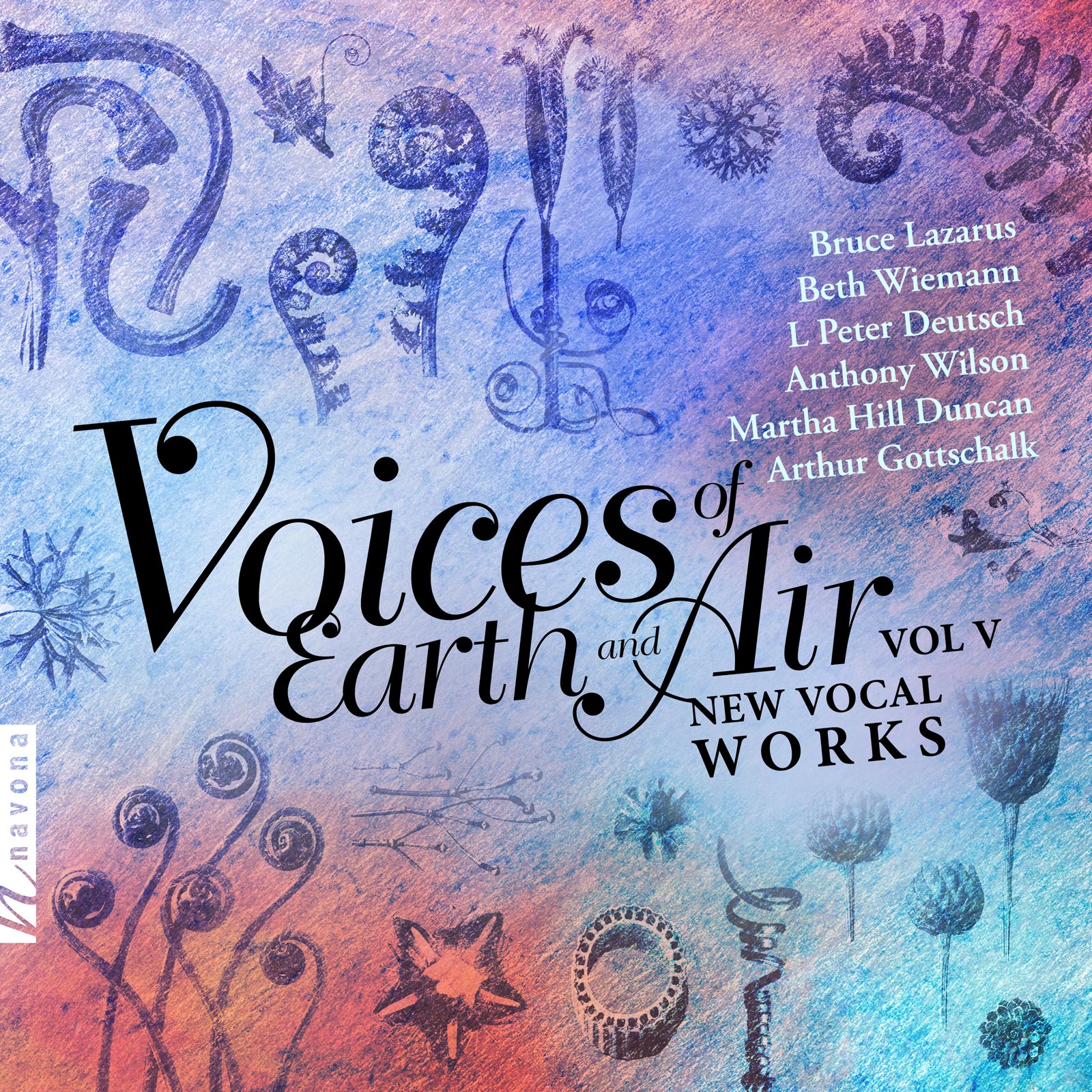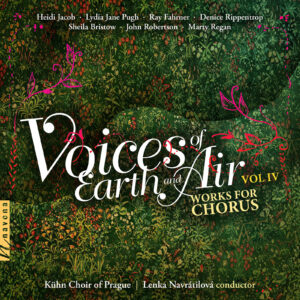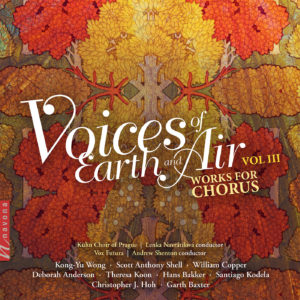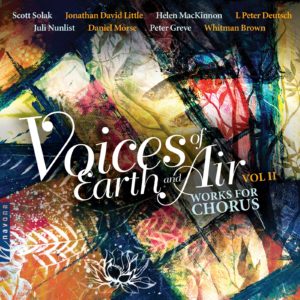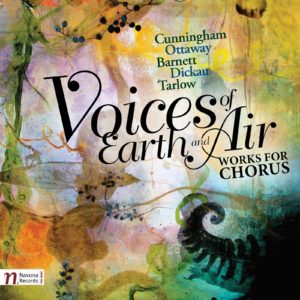Voices of Earth and Air Vol V
Bruce Lazarus composer
Beth Wiemann composer
L Peter Deutsch composer
Anthony Wilson composer
Martha Hill Duncan composer
Arthur Gottschalk composer
Navona Records presents VOICES OF EARTH AND AIR VOL V, a dynamic album showcasing the human voice and the powerful storytelling capabilities that vocal music wields. Six contemporary composers from around the world offer breathtaking works that stir the senses in this release, from hauntingly beautiful ballads to uplifting choral arrangements and climactic moments of triumph. With intimate settings of the human voice with instrumental accompaniment, full-fledged choir works, and everything in between, the composers and performers on VOICES OF EARTH AND AIR VOL V deliver unique and impactful moments that are sure to strike a chord.
Listen
Stream/Buy
Choose your platform
Track Listing & Credits
| # | Title | Composer | Performer | |
|---|---|---|---|---|
| 01 | Friendship Song | Bruce Lazarus | Aliana de la Guardia, mezzo-soprano; Karolina Rojahn, piano | 3:47 |
| 02 | Young Charlotte | Beth Wiemann | Aliana de la Guardia, mezzo-soprano; Yoko Hagino, piano | 10:14 |
| 03 | When We Are Apart | L Peter Deutsch | Vox Futura | Andrew Shenton, conductor | 3:08 |
| 04 | The Dimensions of Love | L Peter Deutsch | Vox Futura | Andrew Shenton, conductor | 4:06 |
| 05 | N'fashot Tzadikim | L Peter Deutsch | Vox Futura | Andrew Shenton, conductor | 3:05 |
| 06 | Tears, Idle Tears | Anthony Wilson | Alexis Peart, mezzo-soprano; Yoko Hagino, piano | 4:10 |
| 07 | A Bird Came Down the Walk | Anthony Wilson | Alexis Peart, mezzo-soprano; Yoko Hagino, piano | 6:08 |
| 08 | Saskatchewan Songs Excerpts: I. Outside to Play on a Winter’s Day | Martha Hill Duncan | Aliana de la Guardia, mezzo-soprano; Yoko Hagino, piano | 3:06 |
| 09 | Saskatchewan Songs Excerpts: II. Bike Ride in the Country | Martha Hill Duncan | Aliana de la Guardia, mezzo-soprano; Yoko Hagino, piano | 3:57 |
| 10 | Saskatchewan Songs Excerpts: IV. Prairie Lily | Martha Hill Duncan | Aliana de la Guardia, mezzo-soprano; Yoko Hagino, piano | 3:16 |
| 11 | Litany | Arthur Gottschalk | The Prairie View A&M Concert Choir | A. Jan Taylor, director; John Cornelius, piano; Axiom String Quartet | Karl Blench, conductor; Dominika Dancewicz, Ingrid Gerling - violin; Nina Bledsoe, viola; Patrick Moore, cello | 10:04 |
Friendship Song
“The Arrow and the Song” by H. W. Longfellow
Commissioned by Mary Ittelson in honor of her friends
The Dimensions of Love
Text from “love is more thicker than forget” by E. E. Cummings. Copyright 1939, © 1967, 1991 by the Trustees for the E. E. Cummings Trust, from COMPLETE POEMS: 1904-1962 by E. E. Cummings, edited by George J. Firmage. Used by permission of Liveright Publishing Corporation.
Saskatchewan Songs Excerpts
Text by Bonnie Cutsforth-Huber
Friendship Song
Recorded May 24, 2016 at Futura Productions in Roslindale MA
Editing Shaun Michaud
Session Engineer and Producer John Weston
Session Producer Jeff LeRoy
Young Charlotte
Recorded January 18, 2023 at Shalin Liu Performance Center in Rockport MA
Session Producer Lucas Paquette
Session Engineer Luke Damrosch
When We Are Apart, The Dimensions of Love
Recorded October 23, 2021 at Futura Productions in Roslindale MA
Session Engineer John Weston
Session Producer Noel Smith
N’fashot Tzadikim
Recorded 2021 at Futura Productions in Roslindale MA
Session Engineer and Producer Noel Smith
Session Engineer and Producer John Weston
Tears, Idle Tears, A Bird Came Down the Walk
Recorded June 29, 2022 at Shalin Liu Performance Center in Rockport MA
Session Producer Brad Michel
Session Engineer Tom Stephenson
Saskatchewan Songs Excerpts
Recorded January 17, 2023 at Shalin Liu Performance Center in Rockport MA
Session Producer Lucas Paquette
Session Engineer Luke Damrosch
Litany
Recorded on September 21, 2019 at the Opal Johnson Smith Auditorium of Prairie View A&M University in Prairie View TX
Session Producer John Cornelius, Arthur Gottschalk
Session Engineer Andrew M. Bradley
Editing, Mixing Lucas Paquette (tracks 2-5, 8-10), Ethan Fields (tracks 6, 7)
Mastering Melanie Montgomery
Executive Producer Bob Lord
A&R Director Brandon MacNeil
A&R Danielle Sullivan
VP of Production Jan Košulič
Audio Director Lucas Paquette
Production Manager Martina Watzková
Production Director Levi Brown (tracks 3-4)
VP, Design & Marketing Brett Picknell
Art Director Ryan Harrison
Design Edward A. Fleming
Publicity Patrick Niland, Aidan Curran
Artist Information

Bruce Lazarus
New York City composer Bruce Lazarus characterizes his extensive catalog of instrumental and vocal music as "diverse, concise, architectural, contemporary, and in turn meditative, energetic, humorous, moody, and exuberant.” Lazarus' music has often been inspired by astronomical imagery, woodlands and mountain trails, and lifetime involvement in the worlds of theater and dance. His works are published at Universal Editions and Swirly Music, and his albums - Musical Explorations of the Messier Star Clusters and Nebulae, Works for Solo Piano, November Sonata, and Song of the Earth - are available on iTunes, Amazon, and Spotify.

Beth Wiemann
Beth Wiemann was raised in Burlington VT, studied composition and clarinet at Oberlin College and received her Ph.D. in composition from Princeton University. Her works have been performed nationally and internationally by the ensembles Continuum, Transient Canvas, Earplay, Guerilla Opera, and others. Her compositions have won awards from the Orvis Foundation, Copland House, the Colorado New Music Festival, New York Treble Singers, and regional arts councils. She teaches clarinet, composition, and music theory at the University of Maine.
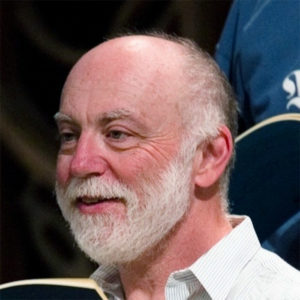
L Peter Deutsch
L Peter Deutsch is a native of Massachusetts, now living in Sonoma County CA, and British Columbia, Canada. He writes primarily for small instrumental or a capella vocal ensembles, spanning styles from devotional to romantic to jazzy, and from Renaissance to early 20th century. Works to date include four choral commissions; releases through PARMA Recordings include music for chorus, string quartet, woodwind and brass quintets, piano trio (featuring work with Trio Casals), and full orchestra.
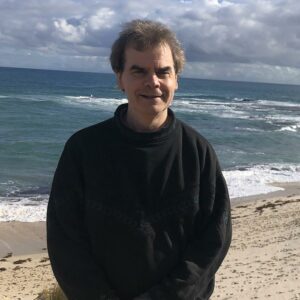
Anthony Wilson
Anthony Wilson (b. 1962) developed a strong interest in music from an early age. He spent many hours at the piano as a child, experimenting with various combinations of sound. His parents’ record player also provided the wonderful experience of being able to enjoy both the world of classical music and popular music.

Martha Hill Duncan
Martha Hill Duncan’s passion for music started early, inspired by her mother, who sang and played the piano by ear. She was a member of the first graduating class of the Houston High School for Performing and Visual Arts, (Vocal Music ’74) and earned a Bachelor of Music degree in Composition from the University of Texas at Austin (1979). She is grateful to many inspirational and generous teachers including composers Dr. Donald Grantham and Dr. Sam Dolin and pianists Danielle Martin, Gregory Allen, Dr. Errol Haun, and Trudy Borden.
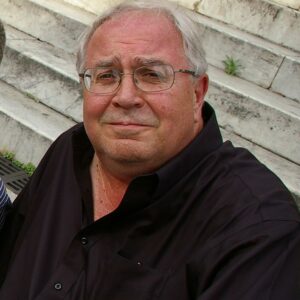
Arthur Gottschalk
Arthur Gottschalk is Professor of Music Composition at Rice University’s Shepherd School of Music, where he founded and directed the school’s electronic music laboratories until 2002, and chaired the composition and theory department for 15 years. His early work as a studio musician led to his co-founding of Modern Music Ventures, Inc., a company which held a recording studio complex, a record production division, four publishing firms, and an artist management division, and for whom he produced records for the PolyGram and Capitol labels, among others.
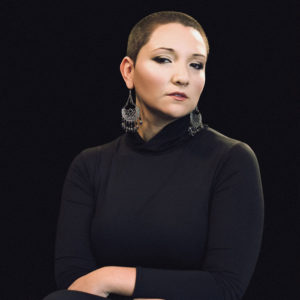
Aliana de la Guardia
The Arts Fuse lauds de la Guardia’s sound as “lovely, natural” and “as clear and powerful as grain alcohol.” As an active soprano vocalist, Aliana de la Guardia has garnered acclaim for her “dazzling flights of virtuosity” (Gramophone) in “vocally fearless” performances that are “fizzing with theatrical commitment” (The Boston Globe). A graduate of the Boston Conservatory and consummate interpreter of new classical concert repertoire, she has enjoyed collaborations with many ensembles featuring today’s most eminent composers including “Scenes from a Novel” and “Kafka Fragments” with violinist Gabriela Diaz by György Kurtág, “Aspen Suite” by Salvatore Sciarrino,“Nenia: the Death of Orpheus” by Harrison Birtwistle conducted by Jeffery Means, and the world premiere of “Earth Songs” by Ronald Perrera with New England Philharmonic, among others.
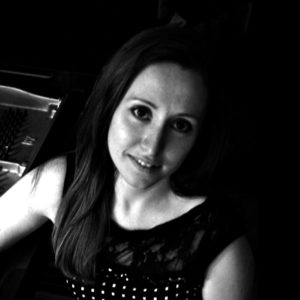
Karolina Rojahn
Karolina Rojahn is a Los Angeles based pianist who has dedicated the last decade of her career to premiering and recording contemporary music repertoire. She has premiered over a hundred new works and collaborated with various classical music labels, most notably Naxos, having released over 43 recordings of chamber and solo piano music, including 5 piano concertos written specifically for her.
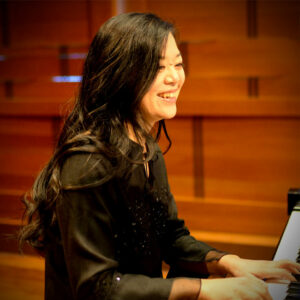
Yoko Hagino
Yoko Hagino was born and raised in Japan, where she began her piano studies at the age of 4. As a child, she performed her own compositions, which took her to Europe and the United States, including performances as a concert soloist with the Czech Symphony, the University of Southern California Symphony, Kyoto City Symphony, and Ensemble Orchestra Kanazawa. Hagino has appeared as a soloist with Osaka Century Orchestra, UMass Boston Chamber Orchestra, Key West Symphony Orchestra, White Rabbit Sinfonietta, and has also performed various piano recitals ranging from the music of Bach to contemporary repertoire. Hagino is a prize winner of the Steinway Society Piano Competition, the First International Chamber Music Competition, the All-Japan Selective Competition of the International Mozart Competition, and Chamber Music Competition of Japan.

Vox Futura
Vox Futura is New England's premier recording choir for composers, recording artists, film, television, and video games. Past projects have included work with internationally distributed classical production house PARMA Recordings, video game companies Nintendo and Bandai Namco, legendary German power metal band Blind Guardian, and platinum selling world music artist Sami Yusef.
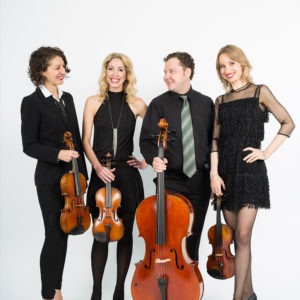
Axiom Quartet
The Axiom Quartet is a dynamic professional ensemble based in Houston, TX. The group is known for creating and performing programs that mix traditional string quartet repertoire and transcriptions of works from a variety of genres (including jazz, electronic, rock, indie, etc.). By combining these genres, the quartet exposes classical music audiences to extraordinary music from different genres, and creates new fans of the classical repertoire.
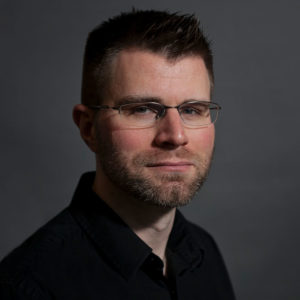
Karl Blench
Karl Blench is a composer and conductor who holds bachelor’s degrees in education and music theory from the University of New Hampshire, and a Master’s degree and DMA in composition from Rice University. His music has been performed throughout the United States, Europe, and Cuba. Recent engagements include performances of his works by the Shepherd School Chamber Symphony, the h2 Saxophone Quartet, the Indianapolis Symphony Orchestra, and the University of New Hampshire and University of Houston Wind Ensembles.

A. Jan Taylor
A. Jan Taylor, educator, pianist, singer and choral conductor, is Director of Choral Music Activities at Prairie View A&M University. A native of Houston TX, she received the Bachelor of Music degree from the University of Houston, the Master of Arts degree from Prairie View A&M University, and the Doctor of Musical Arts degree in Choral Conducting at the University of Houston. Taylor is a member of the Board of Directors of the Bay Area Chorus, and holds memberships in the Texas Music Educators Association, American Choral Directors Association, Texas Choral Directors Association, and Sigma Alpha Iota, a music fraternity for women.

John Cornelius
John L. Cornelius, II is a member of ASCAP and the American Federation of Musicians (Local 65-699). He has written several works for the lyric theater including Garfield: The Musical with Cattitude, Bob Marley’s Three Little Birds, Mirandy and Brother Wind, and The Bingo Long Traveling All-Stars and Motor Kings. His most recent concert works include several song cycles, cantatas and What Wings They Were (chamber opera), Sweet Freedom’s Song: a Fantasia on the hymn-tune America, The River (MFA-Boston), Colored Carnegie (Dance Suite, commissioned by Urban Souls Dance Company) and PAX, commissioned by The Apollo Chamber Players. Cornelius is a native of Jackson MS and is Professor of Music at Prairie View A&M University.
Notes
Videos
Excerpts from American/Canadian composer Martha Hill Duncan’s concert set, Saskatchewan Songs, performed by mezzo-soprano Aliana de la Guardia and pianist Yoko Hagino
